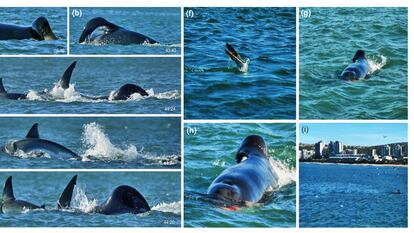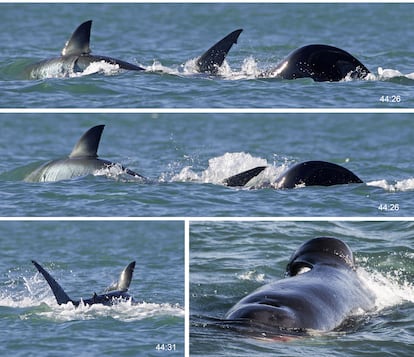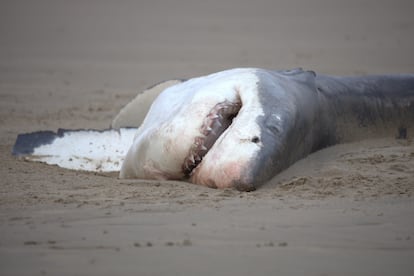Solitary killer whale devours shark in two minutes to defy group hunting habits
The discovery raises questions about the ecological repercussions of great white shark displacement

Orcas, also known as killer whales, are renowned for working in groups. Together they attack sea lions, seals and in recent times even sailboats and private yachts. However, teamwork is not for Starboard, who prefers to act alone. This is the first killer whale in history that has been observed individually hunting a great white shark and devouring it in just two minutes. The staggering predation was captured by a group of scientists off the coast of Mossel Bay (South Africa) and marks an unprecedented behavior that highlights the killer whales’ remarkable dexterity and super-predatory abilities. The findings were published in the African Journal of Marine Science on Friday.
The marine biologist, Alison Towner of Bangor University (Wales, UK) is a great white shark specialist in the region. Thanks to her monitoring of these large predators, together with her team she managed to identify that since 2017 a pair of killer whales hunted and killed sharks off the coast of South Africa, driving large numbers out of their natural settlement spots. They published their findings in the same journal in 2022 and kept documenting the behavior, until they came across the orca Starboard, whose name is derived from a wound on a dorsal fin. The team observed that Starboard acted alone and managed to incapacitate and consume a 2.5-meter shark in a remarkable two minutes. “The moment when Starboard swiftly hunted down my favorite species of shark was both devastating and powerful,” explains Towner. In these interactions, at least two other sharks were killed by orca attacks, as evidenced by the nearby discovery of a second 3.5-meter carcass.

By hunting together, killer whales can circle prey and use their collective intelligence and brawn to attack. Though they can tackle large animals individually, this is the first case involving one of the world’s largest predators. The adroitness with which Starboard devoured the shark suggests remarkable skills, as the research team found that killer whales are showing a strong preference for extracting and consuming livers, which are rich in lipids. This remarkable discovery has been described as specialized feeding behavior. “The observations add more layers to the fascinating story of killer whales and their capabilities as intelligent predators,” says Towner. Although she concedes that it cannot be speculated that this signals a change in hunting strategy, she does believe that it is likely to be a technique previously used. “Killer whales can quickly learn new hunting techniques on their own or from others,” she adds.
Paul Tixier, a marine biologist at the University of Victoria in Canada, says that great white sharks in this region have a low-risk perception of orcas because hunting them is “novel behavior.” These dynamics could lead to selection pressures if sharks continue to perceive killer whales as a low risk. Great white sharks are classified as a vulnerable species on the International Union for Conservation of Nature (IUCN) Red List.
Despite the startling discovery, the occurrence has also raised concerns among experts. The finding, they explain, raises critical questions about the impact and ecological repercussions that predation by killer whales may have on shark populations in the region. “The decline of sharks in the oceans causes cascading impacts on marine ecosystems due to an imbalance in predators,” explains the author. For this reason, they believe it is essential to understand the ecological dynamics for marine conservation efforts.
Specialists point to the need for further research on the causes, but suggest human pressures as a possible cause of the orcas’ displacement. Especially for activities such as hunting and fishing. “Great white sharks are displaced and survival and relocation patterns carry potential risks, such as the overlap with fishing or human encounters in remote coastal areas further east,” Towner points out. This species serves as an important biological flux of nutrients between ecosystems, and therefore abandonment of an area or reduced foraging success can have long-term consequences on the nutrient cycle.

Esther Jacobs, of the marine conservation initiative Keep Fin Alive, acknowledges that while she was astonished to see the predation, she was also concerned about the “profound impact” it could have on the marine ecology. Both the author and Jacobs suggest that given the scenario of changing environmental conditions, constant ecological monitoring is essential to establish adaptive conservation strategies. “Collaboration with shore-based observers, boat-based tourists and various organizations played a critical role in capturing crucial data and video recordings of predation occurrences and might also be critical in conservation efforts.”
They conclude that more research is required to better understand the long-term implications of these interactions between killer whales and great white sharks. Tixier points out that a key strategy is to determine the total number of killer whales feeding on great white sharks and whether they all belong to the same population or to several ones. “Despite my admiration for these predators, I am more and more concerned about the marine ecological balance,” admits Jacobs.
Sign up for our weekly newsletter to get more English-language news coverage from EL PAÍS USA Edition
Tu suscripción se está usando en otro dispositivo
¿Quieres añadir otro usuario a tu suscripción?
Si continúas leyendo en este dispositivo, no se podrá leer en el otro.
FlechaTu suscripción se está usando en otro dispositivo y solo puedes acceder a EL PAÍS desde un dispositivo a la vez.
Si quieres compartir tu cuenta, cambia tu suscripción a la modalidad Premium, así podrás añadir otro usuario. Cada uno accederá con su propia cuenta de email, lo que os permitirá personalizar vuestra experiencia en EL PAÍS.
¿Tienes una suscripción de empresa? Accede aquí para contratar más cuentas.
En el caso de no saber quién está usando tu cuenta, te recomendamos cambiar tu contraseña aquí.
Si decides continuar compartiendo tu cuenta, este mensaje se mostrará en tu dispositivo y en el de la otra persona que está usando tu cuenta de forma indefinida, afectando a tu experiencia de lectura. Puedes consultar aquí los términos y condiciones de la suscripción digital.









































